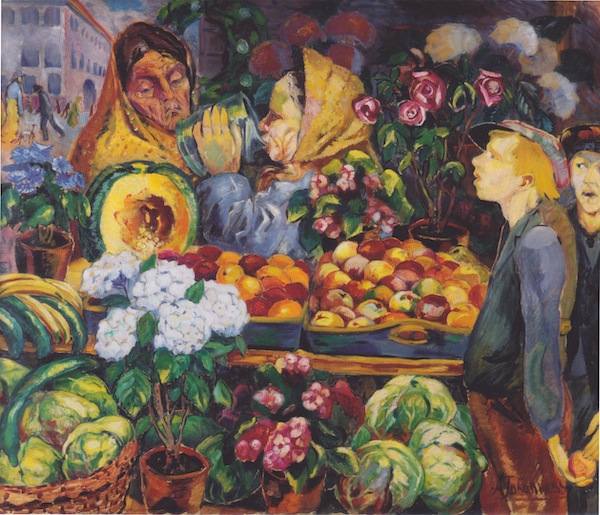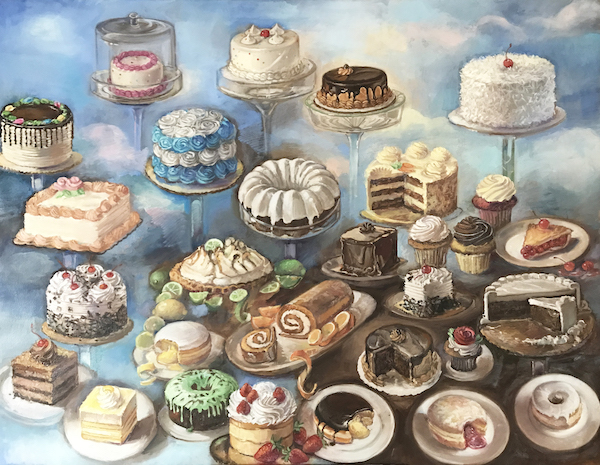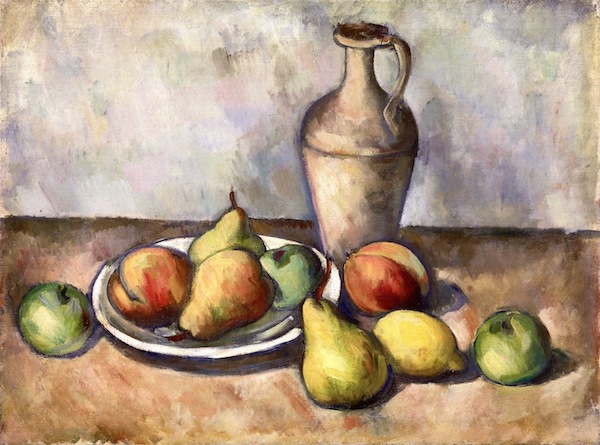Genevieve Wedgbury is an Associate Fellow of the KLC. She is currently in her first year of a DProf with the Cambridge Theological Federation. She is a guest presenter for Radio Maria England and manages her father’s small marine business.

“Knowing the world is knowing ourselves as nature, as survivors with nature, thinking, feeling, celebrating and suffering together, deeply caught up in the longing for mutual flourishing, especially where this is most threatened.”
– Mary Gray
Diana and I were introduced to one another as co-explorers in the world of food and health, though I felt vastly underqualified in this area (and still do and am!). Whereas Diana is a food engineer working on projects to reduce food waste in the UK, my interest in food and well-being developed gradually, and very much as a lay Christian and non-scientist! But I was keen to speak to other Christians who shared my passion and interest.
In reading some of Mary Grey’s work in ecofeminist theology, what struck me is its holistic approach to understanding our place in the web of creation. It seems a natural leap to me to include our relationship with ourselves as part of that web, and more specifically, our relationship with our bodies. In issue 26.7 of the KLC’s Ethics in Conversation, I wrote about “My Journey to Body Literacy,” but as Grey is at pains to stress in her work, the ecofeminist spirit must also be a communal spirit, and what I have discovered most preciously with Diana over the few years we have known each other is friendship and fellowship. As I reflect on our conversations, discussions and prayers, I can see that the Spirit has been most beautifully at work in our walking alongside one another as sisters in Christ.
Approaching this account from the hermeneutic of friendship and fellowship transforms the way we have approached the topic of food and place. It has come about through sharing stories of our own health issues and the ensuing pain and disruption they caused. As our Zoom calls came to an end, we would close in prayer. Those prayers revealed intrinsic beliefs we held that there was hope that things would get better and healing was possible.
In Food and Faith (Cambridge University Press, 2019), Norman Wirzba argues that the act of eating brings us both spiritually and physically into the sacrificial membership which is at the heart of God’s creation, reflecting his self-offering character. But through our fallen, consumerist mindset, our ability to do this faithfully has been compromised. “Ecofeminism involves seeing and knowing the world differently” writes Grey. “It involves knowing ourselves as part of the web of life, in communion and interdependent with all living things. Not, as Descartes wrote, as thinking subject, observing the world as object” (Sacred Longings, 130). We are certainly facing a health crisis in the West with the rise of diet and lifestyle-related diseases. Dr Robert Lustig’s book Metabolical (Harper Wave, 2021) is provocative but to the point: “If you do not fix your food, you continue to court chronic disease and death. If we do not fix our food, we continue to court societal and planetary oblivion” (4, italics his). Food and place matter, as Diana discovered.
Genevieve: What is eating like in Mexico?
Diana: In Mexico City, where I am from, breakfast is accomplished during weekdays if you wake up very early. If not, you’ll be eating breakfast bars, bread or biscuits and coffee. Breakfast during weekends could be a more peaceful experience. Breakfast in Mexico consists of eggs prepared in different ways, like eggs à la mexicana (tomato, onion and green chillies cut in small dices and mixed with scrambled eggs), eggs rancheros (fried eggs on fried corn tortillas with very spicy salsa), eggs divorciados (one fried egg covered in green salsa and the other fried egg covered in red salsa) and other funny flavoured eggs. Eggs come with refried beans, tortillas or bread, salsas, fruit, juice, coffee and sweet bread. Lunch, which is around 2 pm (who can be hungry before 2 pm with such a big breakfast!), consists of soup as starter, then meat (chicken, beef, etc.) prepared in stew or fried and served with vegetables and rice, tortillas, salsas and water flavoured with hibiscus flowers or any fruit or vegetable available, e.g., cucumber and lime water. Then, dessert is typically a fruit jelly or flan. Our dinners tend to be very light – cereal, quesadillas or fruit. If you go out with friends, tacos are the most popular option. We snack a lot and most of our snacks are spicy.

GW: What was eating like for you in Mexico?
DS: It was a time to stop my activities and enjoy life. It was a time to catch up with friends during the day and every day. It was a time to think of something else that was not my job and to plan activities for the weekend (or other free time) with my friends and family.
GW: What did you notice about food when you came to the UK?
DS: Three main differences in descending order: 1) It was way too sweet – even the savoury foods; 2) the fruit and vegetable options were reduced or unaffordable; and 3) wheat products were everywhere. Also, lots of food products use food preservatives and herbicides that I was not used to and gave me stomach/intestinal aches, sometimes even for weeks.

GW: So, your health started to suffer when you came to the UK?
DS: Yes, in two ways. The first one was that I was not allowed to continue with my medication for insulin resistance. The second was that my intestines started to get damaged by the combination of the overexposure to wheat and food preservatives/herbicides and the underexposure to fresh and diverse food. I was feeling bloated and lethargic as never before.
GW: What was the impact on your mental health and your relationship with God?
DS: I started to be very frustrated and sad because things that I used to do were now very difficult or impossible because of my health issues. At the beginning, I was praying a lot alone and with friends. Then, I started to lose faith and feel alone. Over the years, I ended up with a more mature faith in Jesus, knowing that he was leading my battle and that I had to fight it. Very often after praying I used to find the right people who helped me in many ways, physically and mentally (like you). Praying itself makes me feel stronger.
GW: How did you make the link with food/lifestyle?
DS: This was a tricky one because some of my symptoms, for example joint pain, appeared days after eating something that my body didn’t like. My mum (from Mexico) was very helpful. She was keeping a food diary for me and concluded I should stop eating so much wheat. It was also clear to me that the lower sun exposure and the stress of the PhD weren’t helping. In the UK I just wasn’t the same as in Mexico.
GW: What steps did you take to make improvements?
DS: As my health started to decline considerably – and I was being diagnosed with illnesses I didn’t have – I started a trial-and-error method which helped a lot. I tried cutting out foods and preservatives commonly associated with inflammation and intestinal damage. Surprisingly, my symptoms improved when I cut out certain foods that I was used to eating in Mexico. However, my symptoms did not fully disappear until I saw a nutritionist. She did some blood tests and recommended a low histamine diet and several supplements to fix my intestines, which really helped.
It took me nine years – and lots of money and consultants – to convince the GP that my health struggles were also because of the need of the medicine I had been taking since I was a young teenager when I was diagnosed with insulin resistance (like most of my family have been).

GW: What have you learnt during this process?
DS: To be more responsible for my own health. I used to leave that responsibility to “medical experts” but as everyone in their own field knows, you cannot know everything.
GW: What advice would you give to someone in a similar position?
DS: That if you don’t find health improvements with the treatments recommended by “experts,” don’t give up! Go and find somebody that will recommend different tests and treatments that suit you better. That could be the solution.
GW: How has your faith informed your journey towards body literacy/eating in a way that supports your physical and mental well-being?
DS: The Bible tells us that bad situations are not intended in God’s plans. Throughout the Bible we can see how out of bad situations, something good flourishes. Most importantly, through Jesus we have power to overcome evil – in this case, a health issue. By having this faith/belief, who would think of giving up?
Mary Grey writes that, “In fact, Christianity is the one religion where all evil, ambiguity and violence are explicitly excluded from divine being” (Sacred Longings, 128). We can strive towards holistic health and well-being confident that our flourishing is part of God’s plan. She continues to explain how the action of Jesus was “directed to physical sustainability of earth and people” and that his healing ministry was “central” to his mission: “Jesus wants people healed in mind and body. Bodies need to be nourished, fed and healed” (137).
And yet, Christianity presents us with the suffering God of the universe who enters into the heart of the reality of broken bodies and broken minds. We need not feel any shame at our need for healing and restoration, but rather respond to the gentle but urgent calling forth of Christ into all that he has for us.
God makes himself vulnerable, as Grey asserts in Prophecy and Mysticism ([T&T Clark, 1997], 26). The journey towards wholeness is not a one-time task. But in allowing ourselves to be vulnerable in friendship and fellowship with the Body of Christ, we model membership of an interconnected community of life, where in time, healing can occur. And let’s not forget the joy and gift of eating together! If only Diana lived closer, I’d be inviting myself over now for a Mexican feast!

The Kirby Laing Centre for Public Theology in Cambridge. Charity registered in England and Wales. Charity Number: 1191741
Kirby Laing Centre, The New Mill House, Unit 1, Chesterton Mill, French’s Road, Cambridge, CB4 3NP
© 2022 The Kirby Laing Centre for Public Theology in Cambridge